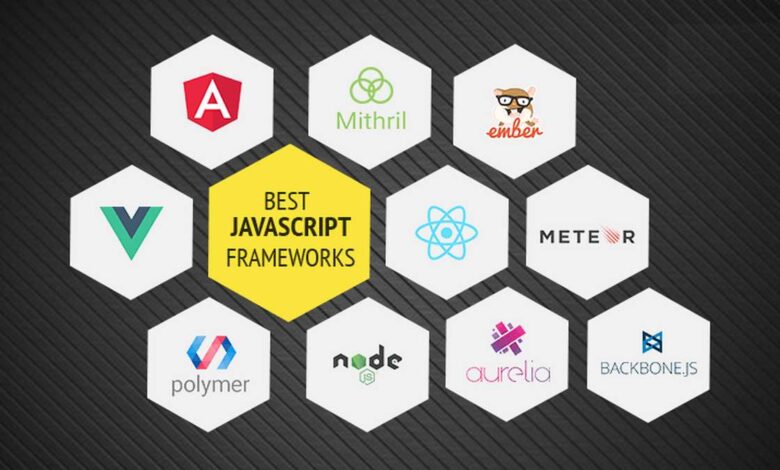Unveiling the Top 5 JavaScript Frameworks for Success in Web Development

In the ever-evolving landscape of web development, leveraging the right JavaScript framework can be a game-changer. These frameworks empower developers to streamline the development process, enhance code maintainability, and create dynamic, responsive web applications. In this article, we’ll delve into the best JavaScript frameworks that are steering the web development ship, offering a blend of versatility, performance, and community support.
1. React.js: The Declarative Powerhouse
React.js, developed and maintained by Facebook, has risen to prominence as one of the most popular JavaScript libraries for building user interfaces. Known for its declarative syntax and component-based architecture, React simplifies the process of creating interactive and dynamic UIs. Developers can efficiently manage the state of their applications, resulting in a smoother and more predictable user experience.
React’s virtual DOM (Document Object Model) enables efficient updates to the UI, enhancing performance by minimizing unnecessary re-rendering. With a vast ecosystem of libraries and tools, including Redux for state management, React has become a go-to choice for both small-scale projects and large-scale applications.
2. Vue.js: The Approachable Contender
Vue.js has gained popularity for its simplicity and ease of integration. Designed to be incrementally adoptable, Vue.js allows developers to add it to existing projects without a steep learning curve. Despite its approachable nature, Vue.js doesn’t compromise on power, offering a flexible and reactive framework for building user interfaces.
Vue’s component-based architecture enables the creation of reusable and maintainable code. With a gentle learning curve, Vue.js has become a favorite among developers looking for a lightweight yet powerful framework. Vue’s ecosystem includes Vuex for state management and Vue Router for building SPAs, making it a versatile choice for a wide range of projects.
3. Svelte: The Compiler-Based Game-Changer
Svelte takes a unique approach to web development by shifting the heavy lifting from the browser to the build step. Unlike traditional frameworks that run in the browser, Svelte is a compiler-based framework that generates highly optimized JavaScript at build time. This results in smaller bundle sizes and improved runtime performance. Here you can find svelte vs vue comparison.
Svelte’s syntax is intuitive and concise, allowing developers to write less code while achieving the same functionality. With its reactive paradigm, Svelte simplifies state management, making it an attractive option for developers seeking a streamlined and efficient framework. As Svelte continues to gain traction, it’s becoming a compelling choice for projects where performance and simplicity are paramount.
4. Angular: The Comprehensive Framework
Angular, maintained by Google, is a comprehensive JavaScript framework that provides a full suite of tools for building dynamic single-page applications (SPAs). Angular’s strength lies in its ability to offer a complete solution, integrating features such as data binding, dependency injection, and a modular architecture.
With TypeScript as its primary language, Angular brings strong typing to JavaScript, enhancing code quality and maintainability. Angular’s CLI (Command Line Interface) simplifies project setup and management, while its two-way data binding streamlines the synchronization of data between the model and the view. This feature-rich framework is particularly well-suited for large-scale enterprise applications.
5. Node.js: The Versatile Runtime Environment
While not a traditional front-end framework, Node.js deserves a mention for its pivotal role in enabling server-side JavaScript development. As a cross-platform runtime environment, Node.js allows developers to use JavaScript for server-side scripting, opening the door to full-stack JavaScript development.
Node.js excels in scenarios where real-time, event-driven applications are essential. Its non-blocking I/O model contributes to high performance, making it an ideal choice for building scalable and efficient server-side applications. When paired with popular frameworks like Express.js, Node.js becomes a powerful tool for creating robust and scalable web servers.
Conclusion
In the vast sea of JavaScript frameworks, choosing the right one for your web development journey is a decision that can significantly impact the success of your projects. Whether you opt for the declarative power of React.js, the comprehensive nature of Angular, the approachable simplicity of Vue.js, the versatility of Node.js, or the innovative compilation approach of Svelte, each framework brings its own set of strengths to the table.
Consider the specific requirements of your project, your team’s expertise, and the long-term maintainability of the chosen framework. Stay informed about the latest updates and emerging trends in the web development landscape, and remember that the best JavaScript framework for your project is the one that aligns with your goals and empowers you to create exceptional web applications.



